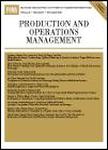-
作者:Dasu, S; Rao, J
作者单位:University of California System; University of California Los Angeles; Babson College
摘要:This paper explores the effect of expectations and information on customer dissatisfaction in unfavorable, nonroutine service encounters. In complex services (e.g., health care) with multiple encounters and wide range of services, customers use some of the services rarely or only once. In such encounters, customers may not have clear expectations regarding the process and/or outcome of the impending service delivery. This may increase the likelihood of the customer to perceive poor service or ...
-
作者:Nie, W; Kellogg, DL
作者单位:University of Colorado System; University of Colorado Denver
摘要:This study empirically tests assumptions that underlie operations management (OM) scholars' belief that service operations should be managed differently. Respondents were self-classified into manufacturing and service types. There is a significant statistical difference between the views held by each group with regard to statements such as service OM should be taught as a separate course and service operations should be managed differently from manufacturing. There was general consensus on the...
-
作者:Hays, JM; Hill, AV
作者单位:University of Minnesota System; University of Minnesota Twin Cities
摘要:This paper develops a simple but powerful model that relates service satisfaction/dissatisfaction to market share. The model is based on an intuitive service satisfaction framework that relates three service system parameters (service success rate, complaint rate, and service recovery rate) to the percent of satisfied customers. A dynamic model is then posited that relates the defection rate and the addition rate to marker share changes. The service satisfaction/market share model yields usefu...
-
作者:Soteriou, AC; Hadjinicola, GC
作者单位:University of Cyprus
摘要:Service quality improvement has become an imperative in today's service firms. In this paper, we present a modeling framework that combines marketing and operations viewpoints for resource allocation. The framework can be used to allocate resources to the different stages of a multistage service system, where the manager's goal is to improve customers' perceptions of service quality, given some budget. Optimal allocation guidelines are provided, and the interplay of three factors on the result...

